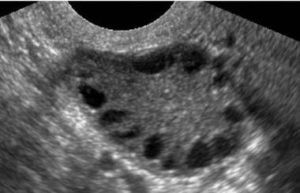PCOS is characterized by a hormone imbalance that can cause infertility as well as other health issues
Women with polycystic ovary syndrome, or PCOS for short, generally have an array of symptoms caused by a hormone imbalance in their bodies. Women with this syndrome generally experience irregular ovulation and menstrual cycles, changes in physical appearance (acne, weight gain, excessive hair growth), heart problems, increased risk for diabetes and infertility. In addition, the ovaries tend to produce excess levels of androgens (male hormones) in women with PCOS, which can also negatively impact ovulation and fertility as well as other medical problems.
September is PCOS Awareness Month, so it’s a good time to talk about this disease that is estimated to affect nearly one in every 10 women. It is a lifelong disorder that is the leading cause of female infertility and a risk factor for many life-threatening illnesses. Yet half of all women with PCOS go undiagnosed.
A woman with PCOS does not release mature eggs
 In a normal ovary, eggs mature and are released every menstrual cycle. Each egg is surrounded by a collection of fluid called a follicular cyst, about the size of a pencil eraser. But for women who have PCOS, there is an imbalance of hormones which can prevent this release. Instead the egg eventually reabsorbs, and the follicle enlarges with fluid. On ultrasound, this collection of follicular cysts look like a “string of pearls” over time.
In a normal ovary, eggs mature and are released every menstrual cycle. Each egg is surrounded by a collection of fluid called a follicular cyst, about the size of a pencil eraser. But for women who have PCOS, there is an imbalance of hormones which can prevent this release. Instead the egg eventually reabsorbs, and the follicle enlarges with fluid. On ultrasound, this collection of follicular cysts look like a “string of pearls” over time.
Many people immediately worry when they hear the word “cyst.” They think of cancer or worry the cysts will “rupture” and cause problems. This is NOT the case. It is normal for a woman to have a cyst every month. But if it is not released, or in other words, if she doesn’t ovulate, the collection of fluid just hangs around month after month, producing more and more androgens (testosterone). This is why the symptoms of hair growth and infertility go together in PCOS.
The hormone imbalance with PCOS interacts with a woman’s metabolism
PCOS can be analogous to a light bulb and its switch. The bulb is okay, but it’s the signal going to the bulb that is abnormal. Along this analogy, the eggs in women with PCOS are normal. They just need the right hormone stimulation. But here’s where it gets complicated. Most women with PCOS also have a problem with their metabolism. Specifically, they respond to carbohydrates much differently than others. The carbs lead to excess insulin and the insulin can cause their ovaries to overproduce testosterone. This, then, interferes with the signal for ovulation. If only we could fix the hormonal signal!
There is good news. Lowering carb intake, increasing exercise and taking medication that can improve insulin levels makes the eggs more responsive, almost like a normal ovary. Testosterone levels can drop, facial hair can disappear and the risk of diabetes can be lowered. Women with PCOS often have a harder time losing weight because their bodies respond to some foods differently. That’s why it’s so important to diagnose PCOS early. If we could warn young women in their teens and 20’s that they should avoid high carbs in their diet and exercise regularly, they may never encounter the infertility, hair growth, acne and risk of heart disease and diabetes later in life. In addition, they may be able to start medication earlier that would benefit them long term.
Left untreated, PCOS can cause infertility, diabetes, cardiovascular disease and even cancer
What should you do if you feel you may have PCOS? Probably, the most important suggestion is to not wait to get an opinion and a diagnosis. Left untreated, PCOS causes infertility and can eventually lead to diabetes, cancer and heart problems. A reproductive endocrinologist who understands the complexities of hormones in a woman’s body can set you on the right path to managing your PCOS. By optimizing any one imbalanced hormone, you are taking a step towards optimizing the others and increasing your chances of becoming fertile.
If you are exhibiting the signs of PCOS or having difficulty getting pregnant, contact us to find more answers.



